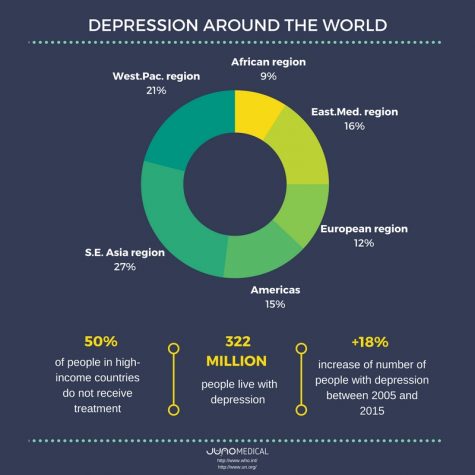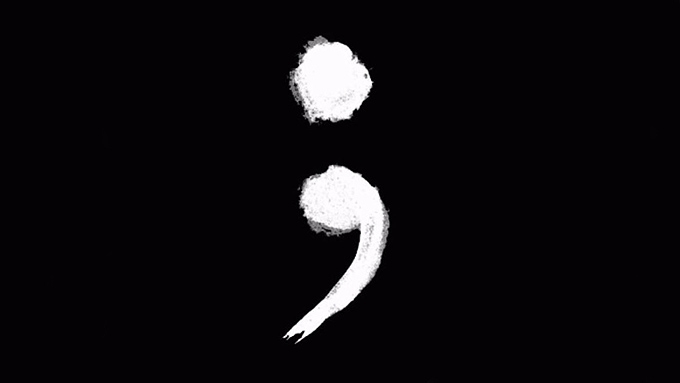The Invisible Addiction: A Story of Depression and Recovery
Philippine Entertainment Portal
The semicolon has been used on social media as a symbol representing continuation after depression
Why me? This is a question many young teens and adults who are struggling with mental illness ask themselves every day. There may not be a clear answer: mental illnesses do not choose their victims, but are a result of unprecedented genetics and circumstances.
An estimated 44,965 Americans die every year by suicide, many younger than 18 years old. Depression is the predominant cause of mental illness, representing 99% of all brain disorders linked to one’s state of mind. It is ranked by the Center for Disease Control and Prevention (CDC) as the leading cause of death in the US for all ages. Furthermore, the CDC states about one person commits suicide influenced by depression in the US every 12-13 minutes. Although this mental health disorder is becoming increasingly common, many still do not know what causes it. One Adams High School senior, referred to as anonymous throughout this article, shares what induced her own depression and the beginning of her anxiety disorder.

Suicide rates in the US from the years 1981 through 2016.
“My mental illness began in 7th grade as a result of many external conflicts, such as being bullied by my former friends and pressure from my parents to perform in school. This then influenced increasing self-doubt and a lack of self-confidence that crushed any respect I had for myself and those around me,” said the anonymous Adams student. “Because I did not like who I was as a person and was continuously insecure in my personality, I developed social and mental anxiety, causing me to skip school about one day a week and struggle to handle my schoolwork as I had no motivation to do anything but sleep.”
Researchers from the National Alliance on Mental Health states that depression is caused by events related to trauma, life circumstances, brain changes, medical conditions, and genetics. Many cases of depression occur later in life during times of distress, uncertainty, or when making major life transitions. Although, it can also lead to a variety of other illnesses and is linked with anxiety, Obsessive Compulsive Disorder (OCD), bipolar disorder, and multiple eating disorders.
“After my depression made me lose any sense of self-respect, it caused me to develop my first eating disorder. Although I would not admit I was sick, I began to ration my food intake, counting calories, and limiting myself to one meal a day. I believed if I ate less and lost more weight, more people would like me and I would finally gain back my self-confidence again,” said the student. “Instead, it lead to my predilection for self-harm, which soon became an addiction as the physical pain numbed the pain I was feeling in my head.”
Depression and eating disorders are typically directly linked. In many cases, depression can lead to an eating disorder, but eating disorders can also lead to depression. For this Adams senior, her depression fueled her addiction to starving herself in order to gain self confidence. However, it could have also had the opposite effect, and caused her to binge eat. Eating disorders like anorexia and bulimia can be life threatening and are most commonly a byproduct of undergoing depressive disorder and anxiety. They occur most frequently when someone endures a trauma or life altering situation, as a way to gain control and stability over their life or current situation.
This lack of self respect and inability to come to terms with reality after experiencing a trauma or simply losing all sense of hope may be what cause a person struggling with mental illness to take their life.
“I weighed only 85 lbs, was obsessed with working out to burn calories, and pushed everyone away because I felt like a burden to everyone who was close to me. The night before Thanksgiving, I tried to take my life. After leaving my parents a suicide note, I took as many pills as possible to end my life, but right after, I realized what I was doing to them and called 9-1-1. I was admitted to the hospital and saw my mom crying, making me realize my parents did care about me, and something needed to change.”
Depression can be treated with the right medical attention and prescription drugs, but can be challenging to overcome as many cultural, cognition, behavioral, and social problems greatly influence one’s mental health. Although she found her way to recovery, she still lives with depression every day.
“A year later, as I look back on it and my journey, I have realized how much better I have become. I have learned to balance a social life with school and my weight and eating habits are completely under control. I workout to feel healthier, not to lose weight. I haven’t inflicted self harm in a year. Yes, I still have ups and downs with my mood and continuously struggle with depression, but I have learned better ways to manage and deal with it. Now, I currently go to therapy regularly and the rate of my panic attacks have significantly decreased.”

Rates of depression around the world.
She believes anyone can overcome their mental illness if given the right help and support from family members and friends.
“I knew I could not get better on my own and I needed help. I decided to tell my story because I want others to know your mental illness does not make you a burden and you do not have to bear it alone. I hope others will escape denial and receive help as soon as possible, because I waited until it was almost too late.”
Depression is a serious mental illness that many teens and adults struggle with everyday. If anyone is ever struggling or appears to be upset, try to support them and assist them in receiving the help they need. No one deserves to go through mental illness alone and it is up to everyone else to be more aware of those that are visibly or invisibly struggling.
If you or anyone you know is struggling with mental illness call the National Suicide Prevention Lifeline to receive help: 1-800-273-8255






